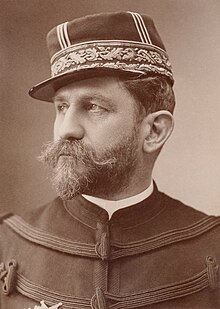
Back جورج إرنست بوولنجر Arabic جورج ارنست بوولنجر ARZ Ksera ke Boulanger jadiwik (yunkexa) AVK Bulanje Azerbaijani Жорж Буланжэ Byelorussian Жорж Буланже Bulgarian জর্জ এর্নেস্ত বুলঁজে Bengali/Bangla Georges Boulanger Czech Georges Boulanger German Georges Boulanger Spanish
Georges Ernest Boulanger | |
|---|---|
 | |
| Minister of War | |
| In office 7 January 1886 – 30 May 1887 | |
| Prime Minister | Charles de Freycinet René Goblet |
| Preceded by | Jean-Baptiste Campenon |
| Succeeded by | Théophile Ferron |
| Member of the Chamber of Deputies | |
| In office 15 April 1888 – 12 July 1888 | |
| Constituency | Nord |
| In office 19 August 1888 – 14 October 1889[1] | |
| Constituency | Nord |
| Personal details | |
| Born | 29 April 1837 Rennes, France |
| Died | 30 September 1891 (aged 54) Brussels, Belgium |
| Resting place | Ixelles Cemetery, Brussels |
| Political party | League of Patriots |
| Spouse(s) |
Lucie Renouard (m. 1864–1891) |
| Children |
|
| Alma mater | École spéciale militaire de Saint-Cyr |
| Signature | |
| Nickname | Général Revanche |
| Military service | |
| Branch/service | French Army |
| Years of service | 1856–1888 |
| Rank | General of division[2] |
| Battles/wars | |
| Part of the Politics series |
| Populism |
|---|
|
|
Georges Ernest Jean-Marie Boulanger (29 April 1837 – 30 September 1891), nicknamed Général Revanche ("General Revenge"), was a French general and politician. An enormously popular public figure during the second decade of the Third Republic, he won multiple elections. At the zenith of his popularity in January 1889, he was feared to be powerful enough to establish himself as dictator. His base of support was the working-class districts of Paris and other cities, plus rural traditionalist Catholics and royalists. He introduced an obsessive and almost pathological anti-German sentiment, known as revanchism, which demanded the complete destruction of Imperial Germany as vengeance for the defeat and fall of the Second French Empire during the Franco-Prussian War (1870–71), into French culture and accordingly laid the foundations for the outbreak of the First World War.
The elections of September 1889 marked a decisive defeat for the Boulangists. Changes in the electoral laws prevented Boulanger from running in multiple constituencies and the aggressive opposition of the established government, combined with Boulanger's self-imposed exile, contributed to a rapid decline of the movement. The decline of Boulanger severely undermined the political strength of the conservative and royalist elements of French political life; they would not recover strength until the establishment of the Vichy regime in 1940.[3] The defeat of the Boulangists ushered in a period of political dominance by the Opportunist Republicans.
Academics have attributed the failure of the movement to Boulanger's own weaknesses. Despite his charisma, he lacked coolness, consistency, and decisiveness; he was a mediocre leader who lacked vision and courage. He was never able to unite the disparate elements, ranging from the far left to the far right, that formed the base of his support. He was able, however, to frighten Republicans and force them to reorganize and strengthen their solidarity in opposition to him.[4]
- ^ "Georges, Ernest, Jean-Marie Boulanger". Assemblée Nationale. Retrieved 22 October 2021.
- ^ Cite error: The named reference
Sorbonnewas invoked but never defined (see the help page). - ^ D.W. Brogan, France under the Republic: The development of modern France (1870–1939) (1940) pp 212–13
- ^ Jean-Marie Mayeur and Madeleine Rebérioux The Third Republic from its Origins to the Great War, 1871–1914 (1984) p. 136